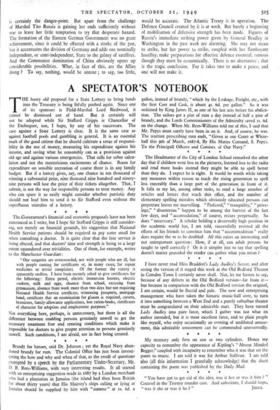The Headmaster of the City of London School remarked the
other day that if children went less to the pictures, listened less to the radio and read more books instead they might be able to spell better than they do. I expect he is right. It would be worth while taking any measures within reason to teach the rising gcncration to spell less execrably than a large part of the generation in front of it. It falls to my lot, among other tasks, to read a large number of articles and letters that reach this office, and the number of elementary spelling mistakes which obviously educated persons can perpetrate leaves me marvelling. " Prefered," "tranquility," " prive- lege," " disasterous " happen to be among the harvest of the last few days, and " accomodation," of course, recurs perpetually. So does " neccessary." A scholar holding a deservedly high position in the academic world has, I am told, successfully resisted all the efforts of his friends to convince him that " accommodation " really does require the m to be doubled. All this raises an interesting and not unimportant question: How, if at all, can adult persons be taught to spell correctly ? Or is it simpler just to say that spelling doesn't matter provided the reader can gather what you mean ?


































 Previous page
Previous page